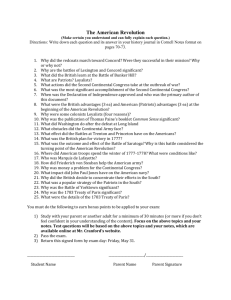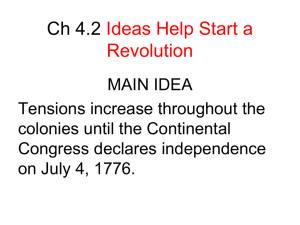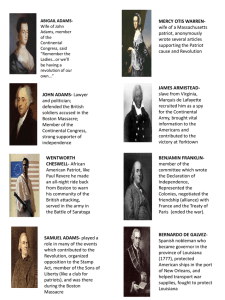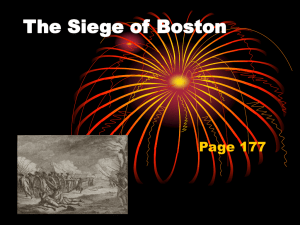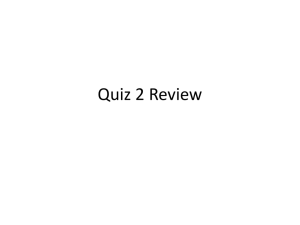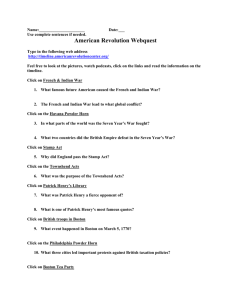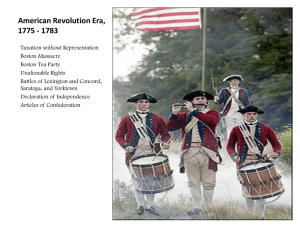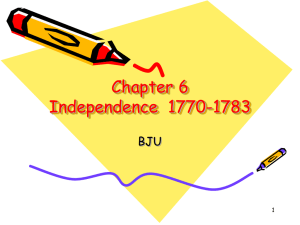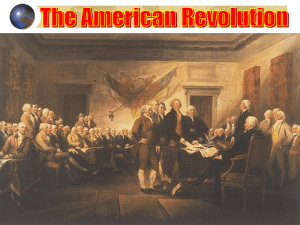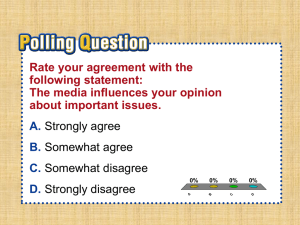The American Revolution 1
advertisement
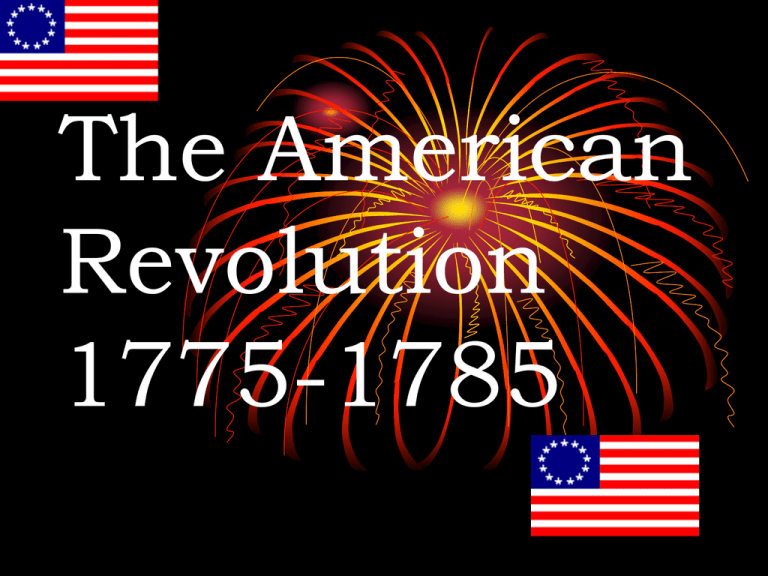
The American Revolution 1775-1785 Key Concepts • Causes and consequences of divisions b/w Patriots and Loyalists in American society. • The origins and significance of the Declaration of Independence. • Factors that led to American victory in the Revolutionary War. • The dispersal of Loyalists to Upper Canada and the Maritimes. • Political and economic challenges facing the USA after the revolution. • Creation and adoption of the United States Constitution. Timeline • 1774- First Continental Congress • 1775-Skirmishes at Lexington and Concord. • 1776-Declaration of Independence, Thomas Paine “Common Sense” • 1777-American Victory at Saratoga • 1781- Articles of Confederation, British surrender at Yorktown. • 1783-Treaty of Paris • 1787- Constitutional convention • 1789- Washington inaugurated as president • 1791-Bill of Rights Reading of the DOI on July 7, 1776 in NY city. There were mixed feelings concerning these public protests. What emotions seem to animating the people? Loyalist Strongholds Washington’s Headaches Only 1/3 of the colonists were in favor of a war for independence [the other third were Loyalists, and the final third were neutral]. State/colony loyalties. Congress couldn’t tax to raise money for the Continental Army. Poor training [until the arrival of Baron von Steuben. Exports & Imports: 1768-1783 Causes of the War • Outgrowth of the colonists’ desire not to be taxed without representation in the Parliament of England. • Over the course of time many taxes were implemented and revoked because of the outrageous reaction from the colonies. • “Taxation without representation is tyranny” became the battle cry of the colonies. The Boston Massacre • In Boston the American’s outrage resulted in violent acts against the British customs officials. • British troops, protecting the customs officials, opened fire into a group of protestors. • Five members of the group were killed, in what later became known as the Boston Massacre. The Boston Tea Party A group of citizens from the Boston area dressed as Mohawk Indians, boarded a ship and dumped over 300 chests of tea into the harbor to protest the monopoly of the East India Trade Company. First Continental Congress • The First Continental Congress was a convention of delegates from twelve of the thirteen North American colonies that met on September 5, 1774, at Carpenters' Hall in Philadelphia, Pennsylvania, early in the American Revolution. • It was called in response to the passage of the Coercive Acts (also known as Intolerable Acts by the Colonial Americans) by the British Parliament. • The Intolerable Acts had punished Boston for the Boston Tea Party. • The Congress was attended by 56 members appointed by the legislatures of twelve of the Thirteen Colonies, the exception being the Province of Georgia, which did not send delegates. • At the time, Georgia was considered a convict state and was not taken into consideration in the colonies. • The Congress met briefly to consider options, including an economic boycott of British trade; publishing a list of rights and grievances; and petitioning King George III for redress of those grievances. • The Congress also called for another Continental Congress in the event that their petition was unsuccessful in halting enforcement of the Intolerable Acts. • Their appeal to the Crown had no effect, and so the Second Continental Congress was convened the following year to organize the defense of the colonies at the onset of the American Revolutionary War. • The delegates also urged each colony to set up and train its own militia. Lexington and Concord • “Gentleman may cry peace, peace! But there is no peace …I know not what course others may take, but as for me, give me liberty or give me death!” • -Patrick Henry The Shot Heard Around the World • April 18, 1775 General Thomas Gage sent 700 redcoats, to seize militia weapons stored at Concord, 30 km west of Boston. • Paul Revere rode overnight from Boston to Lexington and on to Concord, warning the minutemen of the approaching force. • 73 killed and 200 wounded • This battle had ignited a revolution. QuickTime™ and a decompressor are needed to see this picture. George Washington As Commander in Chief, Washington’s first great feat was leading the rag-tag Continental army to victory over the British expeditionary forces in the American colonies. The Battle of Bunker Hill • As important as this battle was to war, it is a common myth, the battle did not actually take place on Bunker Hill. • The American soldiers waited all night for the British, before they ambushed them and forced them to leave Charleston. • This was one of the first of many victories that the Americans had over the British. The Birth of the United States Navy On Friday, October 13, 1775, meeting in Philadelphia, the Continental Congress voted to fit out two sailing vessels, armed with ten carriage guns, as well as swivel guns, and manned by crews of eighty, and to send them out on a cruise of three months to intercept transports carrying munitions and stores to the British army in America. This was the original legislation out of which the Continental Navy grew and as such constitutes the birth certificate of the navy. The United States NAVY The Declaration of Independence • The Declaration of Independence was a document drafted mostly by Thomas Jefferson. • This document stated that the Continental Congress was to sever all ties with Great Britain. • July 4, 1776, the document was adopted and signed; church bells rang to let the people know the good news. The Battle of Trenton • On Christmas Eve 1776, George Washington and his men were cold, tired, defeated, and demoralized. • But when it came time to fight the British, who had many more men, and much more equipment, the American troops pulled it together and beat the British. • This was not only a great victory for America, but it was a great boost for the American morale. QuickTime™ and a decompressor are needed to see this picture. New Jersey’s part in the Revolution • New Jersey played a key part, geographically in the war. • Being in the center of the new nation, it was crossed numerous times by men of both America and Britain. • New Jersey holds the record for getting the most action of the war, followed closely in second with South Carolina. The Battle of Saratoga • The battle of Saratoga is an interesting one. • This was when 6,000 British troops were in upstate New York, traveling southbound. • The American troops cut or burned down all of the bridges in their path. • This made the British an easy target for the American soldiers. • This battle would prove to the French King that they should support the Americans against the English. Saratoga Part 1 QuickTime™ and a decompressor are needed to see this picture. Saratoga Part 2 QuickTime™ and a decompressor are needed to see this picture. Results of the War • The Americans achieved their independence under a form of ad hoc or temporary government. • The end of the war would force the U.S.A to create a more viable and lasting form of government. • In Europe the end of the war depend hostility between France and Britain. • France provided economic support that would weaken their own health. • An influx of Loyalist migration to Upper Canada. Check Your Understanding • 1. What reasons did most soldiers have for joining the Continental Army? • 2. How did the CA create a sense of national identity? • 3. Why did the Americans fail to take Quebec? Famous Quotes of the Revolution “I only regret that I have but one life to give for my country.” ~Nathan Hale “These are the times that try all men’s souls.” ~Thomas Paine “They that can give up the essential liberty to obtain a little temporary safety, deserves neither liberty nor safety.” ~Benjamin Franklin Famous Quotes cont’d “I have but one lamp by which my feet are guided, and that is the lamp of experience. I know no way of judging of the future but by the past.” ~Patrick Henry “The god who gave us life gave us liberty at the same time.” ~Thomas Jefferson “There never was a good war, or a bad peace.” ~Benjamin Franklin Famous People of the Revolution • John Adams • George Washington • John Paul Jones • Nathanial Greene • Betsy Ross • Benjamin Franklin • Patrick Henry • Alexander Hamilton • Thomas Jefferson • Ethan Allen • Molly Pitcher • Paul Revere • John Hancock • Nathan Hale Internet Link about The American Revolution • http://www.rockingham.k12.va.us/ EMS/RevWar/AmRevolution.htm • http://www.edtech.kennesaw.edu/ web.amrevol.html • http://www.theamericanrevolution. org/index.htm • http://www.pbs.org/ktca/liberty/
